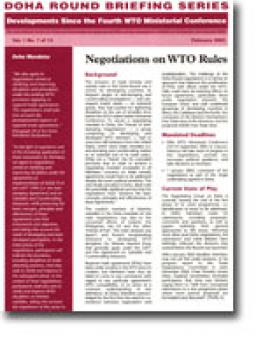
Doha Round Briefing Series - Issue 7 of 13 - Negotiations on WTO Rules
The seventh of a series prepared by the International Institute for Sustainable Development and the International Centre for Trade and Sustainable Development. The inclusion of trade remedy and subsidy rules in the Doha Round was a victory for developing countries. As frequent targets of anti-dumping and countervailing investigations — and subsequent import duties — on industrialgoods, they had pushed for tightening disciplines on the use of remedies since before the WTO's failed Seattle Ministerial Conference. To secure a negotiating mandate in Doha, the ‘Friends of Anti-dumping Negotiations' — a group comprising 14 developing and developed WTO Members — had toovercome stiff resistance from the United States, which views trade remedies (i.e. anti-dumping and countervailing duties) as an essential tool of its trade policy. While not a ‘Friend', the EU conceded pre-Doha that in order to achieve a negotiating mandate acceptable to all Members, concerns on trade remedyagreements would have to be addressed despite the issue's political sensitivity. This view finally prevailed in Doha, albeit with the potentially significant proviso that the negotiations must "preserve the basic concepts, principles and effectiveness of these Agreements."
You might also be interested in
December 2024 | Carbon Minefields Oil and Gas Exploration Monitor
In November 2024, 23 oil and gas exploration licences were awarded across five countries, with Russia granting the licences that account for the largest portion of embodied emissions.
Toward a Coherent, Transformative Approach to Financing Sustainable Development, Climate, and Nature
Four key proposals for the Fourth Financing for Development Conference (FfD4) to create an integrated, equitable approach to financing climate, nature, and development goals.
Green Public Procurement in India
This report analyzes the status of green public procurement (GPP) in India and suggests key strategies for advancing sustainable procurement practices.
Sustainable Asset Valuation (SAVi) of a Small-Scale Tree Planting Initiative in Côte d'Ivoire
This report analyzes the social, economic, and environmental outcomes of a small-scale tree planting initiative at schools in Côte d'Ivoire.